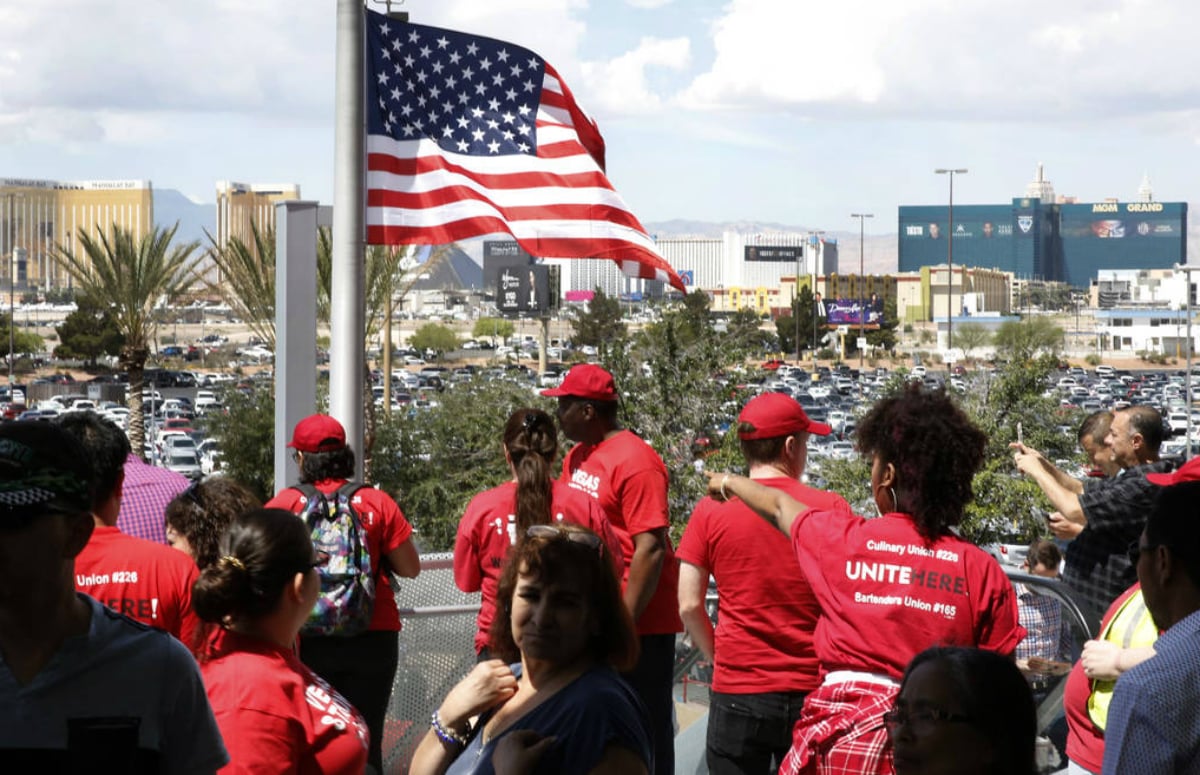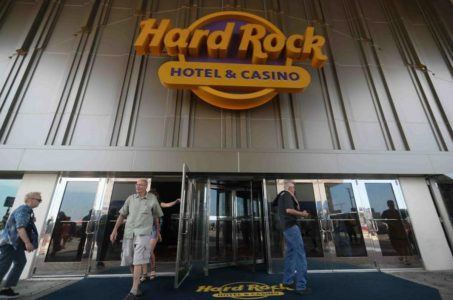Las Vegas Culinary Union Votes to Authorize Strike, 34 Casino Resorts Could Be Impacted by June 1
Posted on: May 23, 2018, 07:38h.
Last updated on: May 24, 2018, 01:22h.
The Las Vegas Culinary Union — composed of 50,000 casino resort workers — voted on Tuesday by a 99 percent member vote to authorize a strike at anytime after 12:01 am Pacific Time on June 1 if efforts to negotiate a Hail Mary pass fail in the next nine days.

The Las Vegas economy could come to a crippling halt if Unite Here’s Culinary and Bartenders Unions goes on a strike that would impact 34 Strip and downtown properties, with all but one — the South Strip’s Four Seasons — being casinos as well as hotel resorts.
Union leaders possess the power to initiate a walkout now that 99 percent of reported voting members on Tuesday backed a strike should new employment terms not be reached. Labor contracts expire at midnight on May 31 at all 34 of those resorts.
A strike would impact 10 MGM Resorts casinos, and eight Caesars Entertainment properties. Penn National, Golden Entertainment, Golden Nugget, and Boyd Gaming also stand to see their workers walk off the job if agreeable terms cannot be negotiated.
The union represents employees ranging from chefs and kitchen workers, waitstaff, bartenders, housekeeping, and bellmen. Unite Here says roughly 25,000 members voted throughout the day at UNLV’s Thomas & Mack Center yesterday.
The Last Resort
Leaders of the Culinary Workers Union Local 226 and Bartenders Union Local 165 can now tell members to stop performing their duties at any given time after June 1. But that direction is something both union officials and casino owners hope to avoid.
“A strike is a last resort. We want to come to an agreement, but the union and workers are preparing for a citywide strike if contracts are not settled,” Culinary Union Secretary Geoconda Argüello-Kline said in a release.

The union is seeking wage increases, protections for existing benefits, and increased workplace safety measures to combat sexual harassment. They also seek assurances against subcontracting and technological innovations that could put members out of work or into reduced roles and fewer hours.
Leaders point to President Donald Trump’s tax cuts, which greatly benefited its union members’ employers, as the basis for saying their demands are reasonable.
“As we continue to bargain in good faith, we are confident that we’ll resolve contract issues and negotiate a contract that works for everyone,” MGM said in a statement to CNBC.
At Stake
Though the odds of a full-fledged strike seem long, the threat of 50,000 workers walking off the job cannot be downplayed.
Many of the properties that would be affected include those that fall into the “$72 million and over” gross gaming revenue category, which are those labeled by UNLV’s Center for Gaming Research as the major players on the Las Vegas Strip.
According to UNLV, 24 such properties collectively won more than $5.5 billion on their casino floors last year. They additionally generated $4.6 billion in room revenue. Add in food and beverage, entertainment, and other services, and the biggest Las Vegas Strip casinos produced over $16.4 billion in revenue.
That equates to nearly $45 million per day. Such losses would of course be devastating to the Las Vegas economy.
Though casino unions have authorized strikes before in Las Vegas, actual walkouts that impact the entire city are uncommon. The last one took place in 1984, when thousands of workers went on a strike that lasted 67 days.
According to professor and author James Kraft — who wrote Vegas at Odds: Labor Conflict in a Leisure Economy, 1960-1985 — that walkout cost the city’s gaming venues the equivalent in today’s dollars of $250 million (there were many fewer casinos back then), along with massive deficits from lost hotel taxes for both Las Vegas and Nevada, due to visitor drops.
Related News Articles
Most Popular
Las Vegas Overstated F1 Race’s Vegas Impact — Report
Vegas Strip Clubs Wrestle in Court Over Animal Names
Most Commented
-
End of the Line for Las Vegas Monorail
— April 5, 2024 — 90 Comments -
Mega Millions Reportedly Mulling Substantial Ticket Price Increase
— April 16, 2024 — 6 Comments -
Long Island Casino Opponents Love New York Licensing Delays
— March 27, 2024 — 5 Comments -
Nearly Abandoned Mall Outside Vegas Soon to Have Only One Tenant
— March 12, 2024 — 5 Comments
















Last Comment ( 1 )
Thanks for giving me this information.